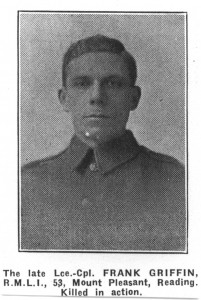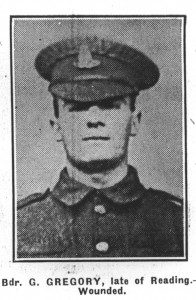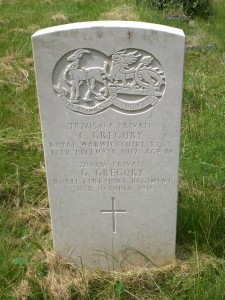Frank Griffin
Lance Corporal PLY/1800(S) (Plymouth Battalion?)
Royal Marine Light Infantry
Division 38
 |
Frank Griffin was the son of Cornelius and Annie Griffin, of 53, Mount Pleasant, Reading; and husband of Ethel Annie Griffin, of 45 Highgrove Street, Reading. Frank Griffin died leaving a small daughter called Doris. He is commemorated on the kerbs of the family grave. Frank was killed in action on 26th October 1917, aged 32.
The 26th October 1917 was the first day of what came to be known as the Second Battle of Passchendaele. On this day the British and their allies improved their positions from Passchendaele to Poelcapelle. Matrix tells us that the attack began at 5.40am. On either side of the Menin road the British 7th and 5th Divisions were frustrated by marshes. The Australians and Canadians took their objectives moving off in a mist that became a heavy rain as the day progressed. The Canadians had 70% casualties. Poelcapelle means church in the bog and it was in a bog that the British fought. Several days later New Zealand troops came upon the remains of the Northumberland Fusiliers and Durham Light infantry lying in rows where they had been mown down by German machine guns as they had made their advance on the first day of the battle.
Frank Griffin is buried in Poelcapelle British Cemetery. Location XVI. F. 10
This cemetery was made after the Armistice by the concentration of graves from other cemeteries and from the battlefields. The great majority of the dead fell in the last five months of 1917, particularly the month of October.
The 1911 census shows us that Frank, now aged 26, was as yet unmarried. He was living wth his parents and other brothers at 3 Mount Pleasant, Silver Street. His father and olderbrother Henry worked at the biscuit factory, Frank and his younger brother Edward were house painters and his brother Ernest was a butcher. Another brother, Albert was not living at home.

